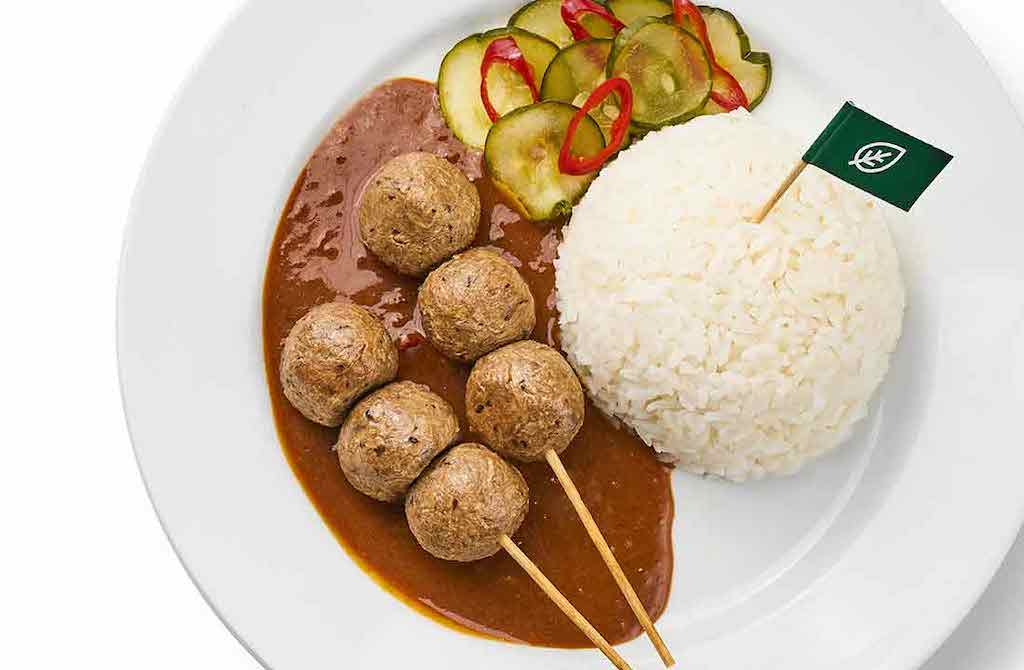IKEA Indonesia Adds 4 New Plant-Based Dishes with Local Startup Green Rebel
3 Mins Read
IKEA Indonesia just dropped four new meatless dishes to its menu. Collaborating with homegrown food tech Green Rebel Foods for the new offerings, the move is part of the Swedish furnishing giant’s global push to turn 50% of its restaurants around the world plant-based by 2025.
IKEA has launched new plant-based dishes in the restaurant section across stores it operates in Indonesia, partnering with local startup Green Rebel Foods for the new menu. Four new dishes have been added, including the Plant Ball and the Plant-Based Sausage Bun, which are meat-free versions of iconic Swedish meatballs and hot dogs. The other two dishes, Plant Balls Teriyaki and the Plant Balls Satay, are Asian-inspired to cater to local tastes.
While the Swedish Plant Ball is not 100% plant-based, as the gravy and mashed potatoes on the side contains conventional dairy, the other three new offerings are vegan-friendly, free from meat, eggs and dairy.
IKEA Indonesia x Green Rebel

For the launch of its new plant-forward menu, IKEA Indonesia chose to collaborate with homegrown Indonesian food tech Green Rebel. Green Rebel is an offshoot of Burgreens, Indonesia’s largest and first vegan restaurant chain.
The startup’s range includes plant-based beef, chicken and sausage alternatives made with non-GMO soy protein, seitan, shiitake mushrooms and chickpeas. Many of its products were developed with Asian tastes in mind, with signature flavours such as Beefless Rendang, Chick’n Katsu and Chick’n Karaage.
Green Rebel says its partnership with IKEA is “aligned with its mission to democratise plant-based meat” across the country, with the new options priced affordably between IDR 10,000 to 60,000 (US$0.70-4.21).

“Health benefits, taste, and affordability are key to accelerate plant-based protein adoption,” shared Max Mandias, co-founder of Green Rebel. “We are honoured to partner up with brands who have the same mission and ambitious sustainable goals to go big on plant-based.”
Capturing the flexitarian market
For IKEA Indonesia, the latest move is aligned with the Swedish furnishing giant’s global plant-based push. As consumers become increasingly aware of the impact of animal agriculture on the planet, the company has placed plant-based foods at the centre of its sustainability goals.
In addition to its pledge to go “fully circular” by 2030, IKEA says it wants to make at least 50% of its in-store restaurant menus plant-based by as soon as 2025. It launched a new vegan Plant Ball last year, which has just 4% of the carbon footprint compared to its traditional meat-based counterpart.

The move will also make its in-store restaurant menu more friendly to the growing swathes of flexitarians in Indonesia. According to recent data, around 4 in 10 consumers worldwide now consider themselves part-time vegans, driven by rising concerns over health and the climate. Mandias commented that IKEA’s new plant-based dishes will “surely accelerate the flexitarian and plant-based movement in Indonesia” even further.
A number of other food companies in Indonesia, including large QSRs such as Starbucks and Domino’s, have also tapped Green Rebel to launch new meat-free items. Meanwhile, Burger King Indonesia has chosen to partner with Unilever subsidiary The Vegetarian Butcher to roll out Plant Based Whoppers across the country.
Elsewhere, IKEA has taken on a similar approach, working with homegrown food techs to develop new plant-based dishes. In Japan, for instance, the company teamed up with Tokyo-based Next Meats to launch a vegan gyudon beef curry.
Lead image courtesy of IKEA Indonesia.



